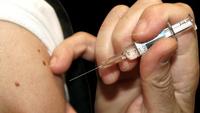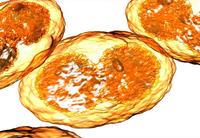-
Medical silver bullet: New drug cures most viral infections

Researchers at MIT’s Lincoln Lab have developed technology that may someday cure the common cold, influenza, and other ailments; the researchers tested their drug against fifteen viruses, and found it was effective against all of them — including rhinoviruses that cause the common cold, H1N1 influenza, a stomach virus, a polio virus, dengue fever, and several other types of hemorrhagic fever
-
-
Gold nanoparticles help to diagnose flu in minutes
Arriving at a rapid and accurate diagnosis is critical during flu outbreaks, but until now, physicians and public health officials have had to choose between a highly accurate yet time-consuming test or a rapid but error-prone test; University of Georgia researchers offer a solution
-
-
Transforming acids into bases
Chemists at the University of California, Riverside have accomplished in the lab what until now was considered impossible: transform a family of compounds which are acids into bases; the research offers vast family of new catalysts for use in drug discovery, biotechnology
-
-
Anthrax vaccine program demonstrates 36 month product stability
Maryland-based PharmAthene has achieved an important program milestone in its recombinant protective antigen (rPA) anthrax vaccine program, and demonstrated thirty-six month stability of its rPA drug product candidate; the data suggest that the rPA product candidate is both highly stable and potent; stability has historically been a stumbling block for other recombinant anthrax vaccine programs
-
-
Natural enzyme can defend against terrorists' nerve agents

Chemicals called organophosphates, found in common household insecticides, can be just as harmful to people as to insects; organophosphates could be released on an industrial scale, through an act of terror or accident, attacking the nervous system by inactivating an enzyme called acetylcholinesterase (AChE); scientists are devising drugs to treat and prevent the toxic effects of organophosphates and related chemicals
-
-
Natural antibody brings universal flu vaccine closer

Annually changing flu vaccines with their hit-and-miss effectiveness may soon give way to a single, near-universal flu vaccine, according to a new report from scientists at the Scripps Research Institute and the Dutch biopharmaceutical company Crucell; they describe an antibody which, in animal tests, can prevent or cure infections with a broad variety of influenza viruses, including seasonal and potentially pandemic strains
-
-
Promise of vaccine against deadly malaria parasite

Every year, 10,000 pregnant women and up to 200,000 newborn babies are killed by the malaria parasite; the body’s immune system normally attacks any foreign body, but since our spleen constantly filters our blood and removes ruined or deform blood cells, the body’s natural defense does not need to check the blood; the malaria parasite exploits this fact by using its advanced arsenal of protein hooks to attach itself to the inner side of the blood vessel; researchers find a soltuon
-
-
Fate of last smallpox virus samples to be determined today

The World Health Organization officially declared in 1979 that smallpox has been eradicated; in the three decades since the WHO declaration, the Centers of Disease Control and Prevention (CDC) in Atlanta, Georgia, and a Russian government laboratory near Novosibirsk have been the last two places to keep samples of the smallpox virus; during this time, there have been many calls by scientists and advocates to destroy these last samples — some of these calls accompanied by dark hints that the two countries wanted to hang on to the samples in order to use them as a basis for a future bio-weapon; the United States opposes the destruction, saying that the live samples are needed to develop vaccine with less adverse side effects as well as two other related drugs; a committee of the World Health Organization is meeting today in Geneva to make a decision
-
-
Secrets of plague unlocked with stunning new imaging techniques
Sandia Labs researchers have developed a super-resolution microscopy technique that is answering long-held questions about exactly how and why a cell’s defenses fail against some invaders, such as plague, while successfully fending off others like E.coli
-
-
New insect repellant may be thousands of times stronger than DEET
The Bill & Melinda Gates Foundation has been supporting a major interdisciplinary research project to develop new ways to control the spread of malaria by disrupting a mosquito’s sense of smell; as part of the project, Vanderbilt University researchers developed an insect repellant which is not only thousands of times more effective than DEET — the active ingredient in most commercial mosquito repellants — but also works against all types of insects, including flies, moths, and ants
-
-
California schools struggle to vaccinate millions against whooping cough
After experiencing its worst whooping cough outbreak in more than six decades, California is taking extra precautions to ensure that children are vaccinated against the preventable disease; California lawmakers mandated that all children entering the seventh grade and up must have a whooping cough booster vaccine; but parents and school districts are still scrambling to get children vaccinated before the Fall when students will be prohibited from entering a classroom without it; nearly three million students must be vaccinated making it a logistical nightmare for schools to process paperwork; in 2010, there were than 7,800 cases of whooping cough and the disease claimed the lives of ten children
-
-
Promising anthrax treatment study results

Researchers find that a multi-agent prophylaxis which is initiated within twenty-four hours after the infection, prevented the development of fatal anthrax respiratory disease; treatment which combines antibiotics with immunization and a protective antigen-based vaccine offered long-term immunity against the disease
-
-
Information about Maryland biolabs scarce
High-level containment laboratories and storage facilities that handle dangerous biological agents exist in Frederick County, Maryland, outside the secured gates of Fort Detrick, but state law mandates that the number and location of each remains confidential; supporters of the current system say that confidentiality is critical to maintain the security and safety of the labs, but critics argue that the secrecy makes it impossible for emergency services in the neighborhood to prepare properly for accidents
-
-
Supreme Court ruling renders vaccine manufacturers immune to lawsuits

The Supreme Court ruled in favor of vaccine manufacturers declaring that they could not be sued in state court for damages as a result of design-defects in their products; the court found six to two that the National Childhood Vaccine Injury Act protects vaccine manufacturers from design-defect claims; the law was passed in response to a massive increase in litigation against vaccine manufacturers that led to a shortage of vaccines; Justice Sotomayor and Ginsberg dissented; the two argued that the decision leaves a regulatory void and insufficient oversight over vaccine manufacturers; proponents say that this helps stabilize the vaccine market and protects children
-
-
BARDA awards Novavax $179 million contract
Maryland-based Novavax, a biopharmaceutical company that produces Virus-Like Particle (VLP)-based recombinant vaccines, has been awarded a $179 million contract by Department of Health and Human Services’ Office of Biomedical Advanced Research and Development Authority (BARDA) to continue developing its new vaccines for seasonal and pandemic flu
-
- All
- Regional
- Water
- Biometrics
- Borders/Immig
- Business
- Cybersecurity
- Detection
- Disasters
- Government
- Infrastructure
- International
- Public health
- Public Safety
- Communication interoperabillity
- Emergency services
- Emergency medical services
- Fire
- First response
- IEDs
- Law Enforcement
- Law Enforcement Technology
- Military technology
- Nonlethal weapons
- Nuclear weapons
- Personal protection equipment
- Police
- Notification /alert systems
- Situational awareness
- Weapons systems
- Sci-Tech
- Sector Reports
- Surveillance
- Transportation
Advertising & Marketing: advertise@newswirepubs.com
Editorial: editor@newswirepubs.com
General: info@newswirepubs.com
2010-2011 © News Wire Publications, LLC News Wire Publications, LLC
220 Old Country Road | Suite 200 | Mineola | New York | 11501
Permissions and Policies
Editorial: editor@newswirepubs.com
General: info@newswirepubs.com
2010-2011 © News Wire Publications, LLC News Wire Publications, LLC
220 Old Country Road | Suite 200 | Mineola | New York | 11501
Permissions and Policies
